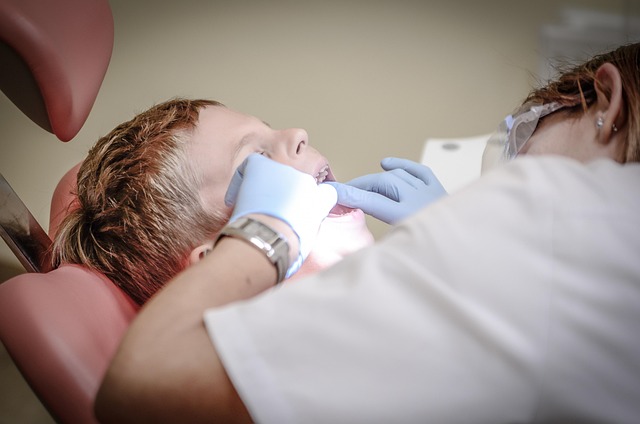Periodontal disease, starting with gingivitis and advancing to periodontitis, is a serious oral health concern. Symptoms include swollen/tender gums, bad breath, and loose teeth. Early-stage treatment involves non-surgical procedures like deep cleaning for plaque buildup. Advanced cases may require surgical interventions such as pocket reduction surgery or gum grafting. McAllen dental clinics offer comprehensive packages, making access to care convenient and affordable. Understanding when to consider a dental referral in McAllen is crucial; it's recommended for complex issues, severe gum disease, or exploring cosmetic dentistry. Regular dental check-ups post-treatment every six months are essential, along with proper at-home hygiene practices. Consulting a top periodontist ensures optimal oral health and answers questions like when to consider a dental referral in McAllen.
Periodontal disease, often overlooked, is a serious oral health condition that affects not just your teeth but your gums and overall well-being. This article explores various treatment options for managing periodontal disease, from understanding its symptoms to post-care maintenance. We delve into non-surgical and surgical procedures, emphasizing the significance of a dental referral in McAllen when necessary. Learn about the available choices, their pros and cons, and discover when seeking expert care, like a McAllen dental referral, is crucial for optimal oral health recovery.
- Understanding Periodontal Disease: Symptoms and Diagnosis
- Types of Periodontal Treatment Options
- Non-Surgical vs. Surgical Procedures
- The Role of a Dental Referral in McAllen
- Post-Treatment Care and Maintenance
Understanding Periodontal Disease: Symptoms and Diagnosis

Periodontal disease, often referred to as gum disease, is a common yet serious oral health issue that requires prompt attention. It begins with inflammation of the gums, known as gingivitis, which can progress to periodontitis if left untreated. Symptoms may include swollen or tender gums, bleeding during brushing or flossing, persistent bad breath, and loose or shifting teeth. If you notice any of these signs, it’s crucial to consider a dental referral in McAllen for proper evaluation and treatment.
Diagnosis involves a comprehensive oral examination, including measuring gum pocket depths and X-rays to assess bone loss. A dentist will also take into account your medical history, as certain conditions like diabetes can increase the risk of periodontal disease. For instance, when dealing with dental trauma in McAllen or severe tooth pain in McAllen that indicates an underlying periodontal issue, a referral for dental orthopedics in McAllen may be necessary to address both the immediate problem and the associated gum health concerns.
Types of Periodontal Treatment Options

When considering periodontal treatment options, it’s important to understand the various approaches available to address gum disease. The first step often involves non-surgical procedures like deep cleaning and scaling, which aim to remove plaque and tartar buildup below the gumline. These methods are ideal for early-stage gum disease and can be effectively performed by dental hygienists during regular checkups or as part of specialized cleaning packages offered at top-rated dental labs in McAllen.
For more advanced cases, surgical interventions might be necessary. Periodontal surgery includes procedures like pocket reduction, where dentists create small incisions to clean and narrow gum pockets, reducing the risk of further infection. In some instances, a dental referral in McAllen may be required for complex issues such as gum grafting or bone and tissue regeneration, ensuring optimal dental care for pregnant women in McAllen and addressing severe periodontal problems. These advanced treatments are designed to restore oral health, prevent tooth loss, and maintain overall dental well-being, considering even the most challenging periodontal conditions. Additionally, many dental clinics in McAllen offer comprehensive cleaning and exam packages, making it easier for patients to access necessary dental care at competitive rates.
Non-Surgical vs. Surgical Procedures

When considering periodontal treatment options, it’s important to understand the distinction between non-surgical and surgical procedures. Non-surgical treatments are ideal for early-stage gum disease, focusing on deep cleaning to remove plaque and tartar buildup. These methods include scaling and root planing, which meticulously clean above and below the gum line, promoting gum health without incisions or stitches.
Surgical interventions become necessary when gum disease has advanced, causing significant tissue damage or bone loss. Procedures like flap surgery and pocket reduction surgery aim to access and clean deep pockets of infection, reduce inflammation, and regenerate bone and gum tissues. For those seeking a dental referral in McAllen for these specialized treatments, a dentist specializing in dentures near me or the best root canal specialist in McAllen can guide patients towards top-rated dental surgery centers with reviews highlighting excellent patient care and successful outcomes, such as those found in McAllen’s premier dental surgery centers.
The Role of a Dental Referral in McAllen

In McAllen, seeking a dental referral is an important decision that can significantly impact your oral health and overall well-being. When should you consider this step? A dental referral becomes necessary when dealing with complex or specialized treatments, such as advanced periodontics. Periodontal disease, affecting the gums and bone structures supporting teeth, often requires expert care beyond the scope of general dentistry. In McAllen, many residents opt for a referral to address concerns like severe gum disease, tooth loss prevention, or cosmetic dentistry options to enhance their smile.
The role of a dental referral in McAllen is crucial, especially when exploring affordable dental care options. While general dentists provide excellent primary care, specialized practitioners, such as periodontists, offer advanced procedures and technologies for complex oral issues. For instance, a referral for dental sleep medicine in McAllen can help manage sleep apnea, a condition often linked to periodontal disease. Additionally, with cosmetic dentistry becoming increasingly popular, patients seeking transformative changes to their smile may benefit from consulting a specialist who can provide tailored treatments, ensuring both functionality and aesthetics.
Post-Treatment Care and Maintenance

After completing your periodontal treatment, proper post-care and maintenance are essential to ensure long-lasting results. It’s recommended to maintain regular dental check-ups, typically every six months, to monitor your oral health and catch any potential issues early on. During these visits, your dentist or periodontist in McAllen may perform various checks, including measuring gum pocket depths, examining the health of your gums and teeth, and taking X-rays if necessary.
Proper oral hygiene practices at home are also critical to maintaining healthy gums and preventing future periodontal problems. This includes brushing twice daily with fluoride toothpaste and flossing once daily. Using an anti-gingivitis mouthwash can further aid in reducing gum inflammation and controlling plaque. Remember, consistent care and regular dental referrals in McAllen, specifically to a top-rated dental lab or specialist for cosmetic dentistry options or dental implants, can help you keep your smile healthy and vibrant for years to come. Consider consulting with the best periodontist in McAllen if you have any concerns or questions about maintaining optimal oral health post-treatment.
Periodontal treatment offers a range of options, from non-surgical procedures like deep cleaning and gum flap surgery to more complex surgical interventions. Understanding these treatments is key to maintaining optimal oral health. While some cases can be managed without a dental referral in McAllen, others, especially advanced periodontitis or severe gum recession, may require the expertise of a specialist. Knowing when to consider a dental referral ensures timely intervention and improves long-term oral health outcomes. Remember, consistent post-treatment care and maintenance are vital for sustained success.
